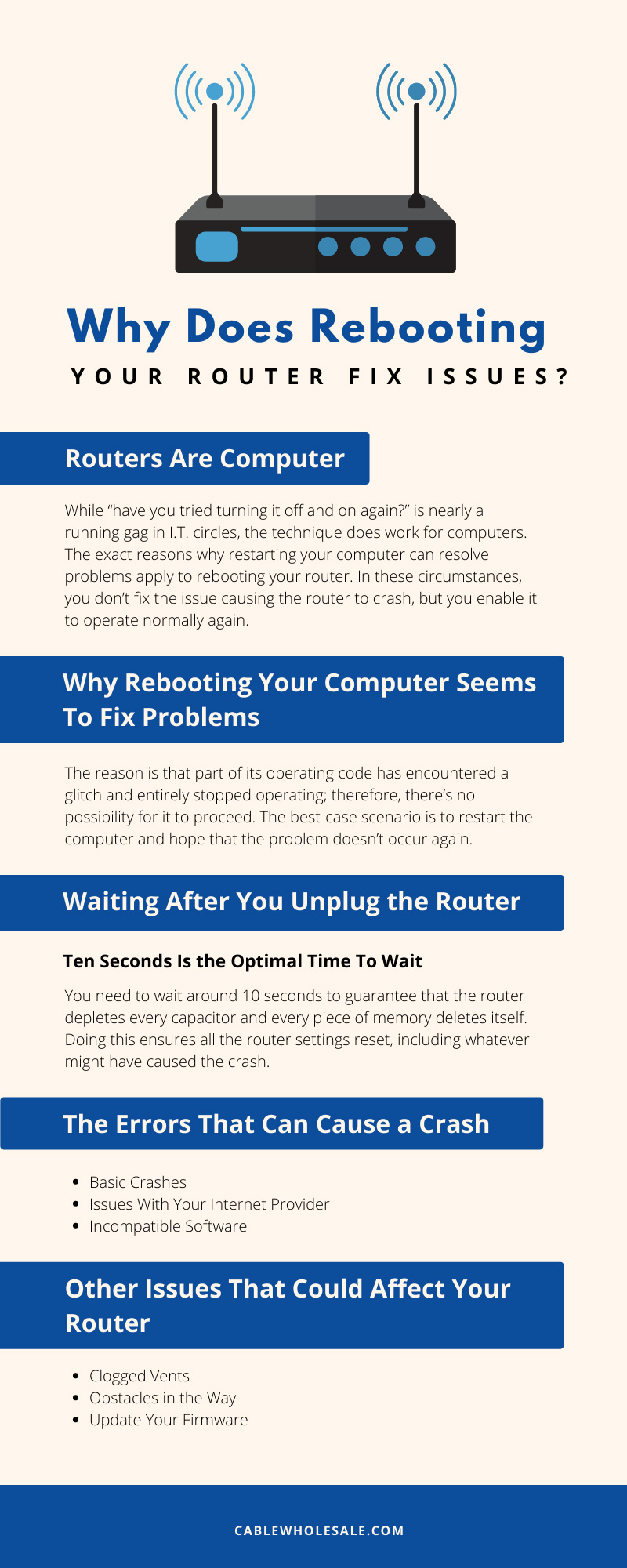
Unplugging and re-plugging your router tends to be the go-to first option anytime people have internet issues. It seems to work like magic each time. In fact, the method almost feels intuitive, meaning that it’s something everyone embraced and did without knowing why it worked.
But why does rebooting your router fix issues? This article will go over how this strategy works to resolve various internet issues.
Routers Are Computers
Your router is a computer, even if you don’t realize it. A CPU, RAM, and storage device within the small box all power the operating system. If you’re familiar with owning a computer, you know things can go haywire at times. Invisible problems can plague these devices, like bugs that create a memory leak, overheating CPUs, or a full-fledged kernel panic that has halted the entire system.
While “have you tried turning it off and on again?” is nearly a running gag in I.T. circles, the technique does work for computers. The exact reasons why restarting your computer can resolve problems apply to rebooting your router. In these circumstances, you don’t fix the issue causing the router to crash, but you enable it to operate normally again.
Why Rebooting Your Computer Seems To Fix Problems
Frequently, a computer encounters a problem associated with a low-level error, often an issue with a device driver or a hardware failure. When this happens, it reaches a point where it’s unsure how to rebound, so it shuts down everything.
Why doesn’t the computer solve the problem instead of restarting the driver or the machine itself? The reason is that part of its operating code has encountered a glitch and entirely stopped operating; therefore, there’s no possibility for it to proceed. The best-case scenario is to restart the computer and hope that the problem doesn’t occur again.
Waiting After You Unplug the Router
So why does rebooting your router fix issues? Essentially, it’s because it’s a computer that needs to reset itself to clear away temporary problems in its memory.
Now that we’ve broken down why you should unplug your router, how long should you keep it unplugged? People’s opinions seem to range between 10 and 30 seconds, but there must be an exact timeframe that you can go with.
Consider that when you disconnect many different devices, you’ll notice that the power light lingers on for a few seconds after. This quirk is because most electronics use capacitors, which are essentially small batteries. Although they can’t store a lot of energy, they can sometimes keep a memory chip going for just a few seconds.
Ten Seconds Is the Optimal Time To Wait
You need to wait around 10 seconds to guarantee that the router depletes every capacitor and every piece of memory deletes itself. Doing this ensures all the router settings reset, including whatever might have caused the crash.
The Errors That Can Cause a Crash
Routers suffer from the same problems as many other devices. Whenever you have a router for a long Routers suffer from the same problems as many other devices. Whenever you have a router for a long time, you’re bound to run into a handful of crashes. Many times, you can resolve these issues with a reboot.
Basic Crashes
When your router executes too many tasks at once or overheats, a simple remedy may be all you need. Try restarting your router, rescanning, or changing channels.
Issues With Your Internet Provider
Routers manage traffic from W-Fi I.P. addresses, which occasionally change or handle public or private updates. As a result, you can free up some space by rescanning or reconfiguring your router.
Incompatible Software
If your router is out of date or you haven’t hooked it up correctly, you can experience hiccups and blips. Upgrading your router can be the best way to resolve these issues.
Other Issues That Could Affect Your Router
While modern routers aren’t delicate pieces of electronic hardware, they may fall victim to the same pitfalls as other devices. You may discover that a quick reboot doesn’t always resolve your problems. Another issue may have emerged when this occurs, affecting the router’s performance. You have several different options at your disposal to try and resolve whatever the problem might be.
Clogged Vents
Overheating causes computers to crash, and your router is no exception. When you unplug your router and it feels hot to the touch, you’ll want to act fast. Your router needs enough ventilation to breathe. Dust and debris clogging your device’s vents can degrade your performance.
Therefore, you’ll want to try to dust the router at least once a month. First, wipe down your router with a clean, dry cloth, being careful not to scratch it. Next, remove your router from naturally dusty areas with poor ventilation.
Obstacles in the Way
You may find your router obscured by barriers or in an inconvenient location. Shifting your router around using signal strength as a guide could be one approach to improve signal dependability. Avoid hiding your router away on a shelf or underneath furniture. You need to give it enough room to operate and send out a signal without obstruction.
Update Your Firmware
Electronic devices require regular updates to continue running efficiently. Even though many will do it automatically, you should double-check to see whether you need to do so manually. This process is usually straightforward. Generally, you need to launch your web browser, enter your router’s I.P. address, and click the update button.
Reboot Your Router Regularly
While troubleshooting potential router issues, you can ease some of your rebooting worries by restarting your router on a schedule. Hopefully, doing so ensures you have to do it manually less often. You’ll have a couple of options that can work in this case.
One technique is to connect your router to a standard outlet timer, which would cut power at a predetermined period and restore power at a designated time. Then, you can configure the router to reboot once or twice a day to keep things running smoothly.
A somewhat more complex option includes running a script on your router that reboots it regularly. This technique will get you the same result as the outlet timer. Although these aren’t long-term solutions to deeper issues, they’re an excellent stopgap until you discover a lasting fix.
Your router is an incredibly complex electronic device that ironically has a straightforward solution to problems. You’ll find that disconnecting and re-plugging your router’s power is a simple, helpful method in most situations.
CableWholesale is your trusted source for a wide range of essential electrical devices and accessories to help you enjoy a fast and reliable internet connection. Check out our bulk ethernet cables to connect multiple P.C.s and other devices to the same network. Don’t hesitate to contact us with any questions about our products.




